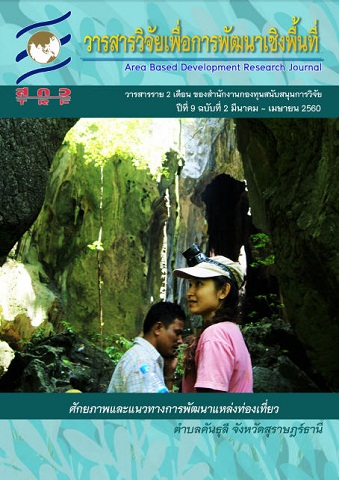ละมุดหวาน น้ำตาลเด็ด ชมพู่เพชร ข้าวเม็ดงาม: การจัดการความรู้เพื่อส่งเสริมเศรษฐกิจสร้างสรรค์ อำเภอบ้านลาด จังหวัดเพชรบุรี
Main Article Content
Abstract
การจัดการความรู้เพื่อส่งเสริมเศรษฐกิจสร้างสรรค์อำเภอบ้านลาด จังหวัดเพชรบุรี มีวัตถุประสงค์เพื่อศึกษาข้อมูลความรู้ของสินค้าเกษตรที่มีความโดดเด่นในอำเภอบ้านลาด ออกแบบกิจกรรมการจัดการความรู้ และศึกษาแนวทางส่งเสริมการจัดการความรู้เพื่อส่งเสริมเศรษฐกิจสร้างสรรค์ วิธีการศึกษาข้อมูลความรู้ ใช้การสังเกต สัมภาษณ์ และสนทนากลุ่ม ตรวจสอบข้อมูลร่วมกันโดยคณะผู้วิจัย ผู้ช่วยวิจัย และผู้รู้ในชุมชน การออกแบบกิจกรรมการจัดการความรู้ฯ และการศึกษาแนวทางส่งเสริมการจัดการความรู้ฯ ใช้การสนทนากลุ่มร่วมกับชุมชนและผู้ทรงคุณวุฒิ ผลการวิจัย ได้ชุดความรู้ 4 เรื่อง คือ ละมุด ตาล ชมพู่ และข้าว จัดทำหนังสือส่งเสริมภูมิปัญญาท้องถิ่น จำนวน 4 เล่ม และจัดทำ E-book เผยแพร่ในอินเทอร์เน็ต แนวทางการส่งเสริมการจัดการความรู้ฯ มีข้อเสนอต่อชุมชน ให้นำความรู้จากหนังสือส่งเสริมภูมิปัญญาท้องถิ่นไปใช้เพิ่มมูลค่าของสินค้าและบริการ เช่น ผลิตสินค้าสร้างสรรค์ จัดกิจกรรมท่องเที่ยวเชิงเกษตร เปิดพื้นที่สร้างสรรค์ในชุมชนเพื่อจัดกิจกรรมการเรียนรู้ เช่น ประกวดงานศิลปหัตถกรรมจากผลผลิตด้านการเกษตร จัดเทศกาล จัดการแสดง เป็นต้น ข้อเสนอต่อสถานศึกษาในชุมชนทั้งในและนอกระบบ ได้แก่การนำองค์ความรู้จากการจัดการความรู้ไปใช้ในการจัดกิจกรรมการเรียนรู้เพื่อสืบสานภูมิปัญญาท้องถิ่น และพัฒนาหลักสูตรท้องถิ่น ใช้กระบวนการวิจัยและพัฒนาเพื่อขับเคลื่อนชุมชน ให้สถาบันอุดมศึกษาเข้ามามีส่วนร่วมอย่างต่อเนื่อง และชุมชนควรใช้ผลผลิตจากการจัดการความรู้เป็นเครื่องมือในการสร้างความตระหนักและความภาคภูมิใจให้แก่ชุมชน
Lamud Wan (Sweet Sapodilla), Namtan Ded (Good Sugar from Sugar Palm Tree), Chomphù Phechr (Rose Apple), Khaw Med Ngam (Beautiful Rice): Knowledge Management for Enhancing Community Creative Economy of Ban Lat District, Phetchaburi Province
The objectives of the project of knowledge management for enhancing community creative economy of Ban Lat district, Phetchaburi province are; to study the knowledge of its outstanding products, design the activities of knowledge management, and study the guidelines to enhance Ban Lat’s creative economy. Observation, interview and focus group discussion are used to study the knowledge. The analysed data is triangulated by the research team, research assistants and local wisdoms. The guidelines to enhance the knowledge management are studied by the focus group discussion with community members and experts. The products of the research is a series of 4 books enhancing local wisdom. These are also published as E-books posted on website. Regarding guidelines of knowledge management for enhancing community creative economy, this research proposes that the community apply knowledge from the books, which promote local wisdoms in value-added products such as creative products, agricultural tourism activities and open creative zones to provide learning activities: art and craft from agriculture contests, festivals and show, etc. The research also suggests both formal and informal education institutions in the community that they should bring knowledge from knowledge management to organize learning activities that conserve local wisdom, to develop the local curriculum and to use the process of research and development to drive the community. Higher education institutions should be involved continuously and the community should use the output from the knowledge management as a tool to raise their awareness and pride.
Article Details
Area Based Development Research Journal values copyright protection and licensing to safeguard author rights and facilitate the appropriate dissemination of research. Our policies ensure openness, accessibility, and attribution. Authors retain copyright ownership, and articles are published under a Creative Commons Attribution License (CC BY), allowing sharing, adaptation, and proper attribution. Authors have the freedom to publish under the CC BY license, granting broad reuse and distribution permissions. The journal supports posting articles on third-party repositories, adhering to institutional and funding restrictions. Author guidelines detail copyright and licensing requirements, empowering authors with knowledge about their rights and responsibilities. These policies cultivate an environment of collaboration, openness, and responsible sharing, benefiting authors and the research community while honoring intellectual property rights.


